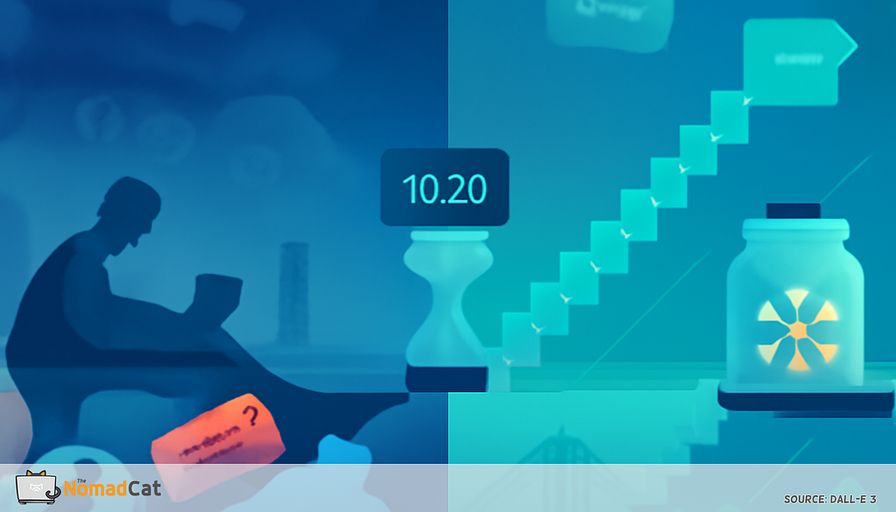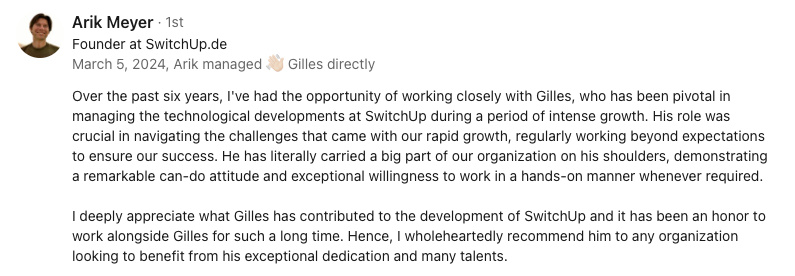Abstract:
The article addresses the costly consequences tech freelancers across Europe face when they procrastinate on financial admin tasks like tax returns and pension top-ups, highlighting that even brief delays can lead to penalties, lost tax benefits, and permanent reductions in long-term savings. Drawing on examples from countries such as Germany, France, Spain, the UK, and the Netherlands, it illustrates how missed deadlines rapidly translate into financial setbacks—sometimes costing thousands in lost growth or tax relief. The piece explores why freelancers, despite knowing better, tend to postpone admin work, pointing to mental overload, present bias, and decision paralysis as key culprits. It notes how supposedly minimalist systems can backfire by making it feel safe to keep waiting, and how psychological tendencies like loss aversion and optimism bias reinforce delays. To counter this, the article offers practical strategies: breaking big tasks into micro-deadlines, using accountability from peers, and leveraging simple digital tools and automation to turn admin into a background routine. Personal anecdotes and real-world examples ground the advice, showing how freelancers who adopted automated reminders, recurring payments, and light peer check-ins saw reduced stress, fewer penalties, and improved savings. The article concludes with a quick-start guide featuring minimalist apps and a 30-minute setup plan, emphasizing that small, systematic changes—supported by digital tools and peer nudges—can make financial admin manageable, protect future earnings, and turn good intentions into lasting habits.
Ever put off a tax return or pension top-up, telling yourself you’ll get to it tomorrow? For tech freelancers in Berlin, Lisbon, or Amsterdam, a little delay can seem harmless—but the costs add up faster than you might think. Across Europe, missing paperwork deadlines doesn’t just cause headaches. It often leads to penalties, lost benefits, and missed long-term savings. These risks are real, and the impact can be bigger than you expect—especially for those of us who value autonomy but sometimes struggle with the admin side of freelance life.
This article is for tech freelancers working across Europe, whether you’re coding in a coworking space in Barcelona or juggling projects from your flat in Rotterdam. We’ll break down what happens if you wait too long: from late fees in Germany and Spain to the yearly pension contribution windows in the UK and Netherlands. You’ll see why even simple systems don’t always help, how our brains trick us into putting things off, and—most importantly—practical strategies to break the cycle. Expect micro-deadlines, subtle peer pressure, and digital tools that turn admin into a background task, all tailored to the European freelance scene.
Small changes—some as quick as five minutes—can protect your earnings, reduce stress, and help these new habits stick. If finance admin has ever seemed overwhelming, you’re not alone. Let’s see how to make it easier, one step at a time.
The true cost of waiting
When small delays become big losses
It’s easy to shrug off a late tax filing or skipped pension top-up as a minor issue. But these small delays love to pile up. Every missed deadline chips away at your savings. Sometimes, penalties follow or benefits are lost forever. These setbacks are more common than you’d think, and country-specific rules show just how quickly things can snowball.
Penalties across Europe: A harsh reality
In Germany, France, and Spain, tax offices don’t mess around with late submissions. Even a single missed deadline gets expensive, fast. For example:
- Germany: 0.25% of tax owed per month (minimum €25) after 14 months.
- France: 10–40% penalty on tax due, plus 0.2% monthly interest.
- Spain: 1% penalty plus 1% per month (up to 12%), then jumps to 15%; for serious cases, it can reach up to 150%.
Penalties sting, but missing pension contributions can do even more harm.
Pension deadlines: One shot per year
Skipping your annual pension window in the UK or the Netherlands is more than just annoying paperwork. You lose that year’s tax benefit and growth opportunity forever. These missed chances don’t come back; when the window closes, so do your options. Here’s a simple example.
What one missed payment really costs
A freelancer who forgets a €6,000 pension top-up one year isn’t just missing the deposit. Over ten years, that single lapse could mean nearly €6,000 in lost growth—not to mention the missed tax relief. Here’s the rough breakdown:
- €6,000 missed at 7% growth over 10 years ≈ €5,800 lost gains.
- One year without tax relief.
This outcome is typical; it’s what many freelancers really face.
Real-world impact: Penalties and lost growth
Tax authorities all over Europe warn about missing deadlines. Penalties, interest, and lower future pensions aren’t rare—they’re the usual outcome. Typical results include:
- Financial penalties right away
- Extra interest on late payments
- Reduced pension in the future
These problems can stick around for years.
Permanent hits to your future
Findings from pension groups in France, Germany, and Italy show that missing or delaying payments often lowers pension benefits for good. Even a single missed payment can shrink retirement income for life. Sometimes, catching up isn’t an option.
One slip is all it takes
Even freelancers with automated admin can get caught by a forgotten quarterly tax or a pension transfer done a day late. These lapses are more common than people think—and they can be expensive. Understanding why these slips happen is important.
Why tech freelancers procrastinate even when they know better
The hidden weight of mental overload
Juggling code, client emails, and tax forms is daily life for many tech freelancers. Switching between tasks leads to mental fatigue, turning simple admin into a real hassle. According to a 2023 survey by Freelance Europe, 62% of tech freelancers said paperwork and compliance were the most stressful parts of their job, with 47% admitting they’ve missed at least one important deadline in the past year. It’s not a rare annoyance—it drains energy and motivation.
I remember my first year managing a multicultural team in Berlin. I was so focused on keeping up with client work and onboarding new developers that I let my own tax paperwork slide. The result? A late fee and a week of stress, all for something that would have taken 20 minutes if I’d just done it on time. That lesson stuck with me.
Dislike turns into delay for most
Survey data shows over half of tech freelancers dislike handling admin and put off financial tasks as long as possible. This isn’t just a mild dislike—it’s a big reason so much gets postponed. Stress makes this worse; the brain tends to dodge admin, even when it’s important.
Overload triggers avoidance, not laziness
When overwhelmed, your brain prefers tasks that feel easier or more fun—so finances slide to the end of the list. This isn’t laziness; it’s a normal response to too much stress. Certain patterns make procrastination even more likely.
The minimalist paradox and the mind’s blind spots
When simplicity becomes an excuse
Minimalist systems—automated transfers, single accounts, recurring reminders—are meant to help. But they can also backfire. It feels easy enough to think, “It’s all set up, I’ll do that admin tomorrow.” In reality, simplicity sometimes gives us more reasons to wait. This is where mind tricks start to work against us.
Present bias: Why now always wins
Present bias means focusing on things that feel urgent or enjoyable, pushing less exciting admin down the list. You spend an hour fixing code or chatting with a client, telling yourself admin can wait. But waiting becomes a habit.
Fear, optimism, and the freeze
Other thinking habits add to the problem:
- Loss aversion: Avoiding admin to dodge a possible unpleasant surprise (like a big tax bill)
- Optimism bias: Believing you’ll deal with it soon, even as deadlines slip by
Pension choices are another sticking point.
Too many choices, so nothing gets done
Facing a maze of pension or tax options can lead to decision paralysis. With too much choice, doing nothing feels safest. Still, there are ways to break through and make progress—one tiny step at a time.
Behavioral hacks for minimalist freelancers
Micro-deadlines make big tasks manageable
Big, irregular admin jobs like annual taxes or quarterly pensions feel overwhelming. Splitting them into quick, timed steps makes things much easier. For example:
- Upload a receipt or invoice in 10 minutes
- Set up a pension transfer in a short afternoon break
- Use 15 minutes to check missing paperwork
Starting is easier with smaller steps, and the whole process stops feeling so huge. A bit of peer accountability can make these actions even easier to complete.
Here’s a quirky fact: In Lisbon, where many tech freelancers gather, local coworking spaces have started “admin sprints”—short, focused sessions where everyone does their paperwork together for 20 minutes. The peer pressure (and free coffee) works wonders.
Commitment contracts raise the stakes gently
Simple commitments—a public promise or a quick check-in with someone—add a little pressure to finish. Even a small update in a community or a shared checklist with a friend can be enough. Studies show this gentle social accountability helps.
Science says these strategies really work
Research on behavior shows that breaking tasks into smaller bits and adding peer accountability leads to more things getting done on time, with less stress. Digital tools can help cement these habits.
Personal automation and default settings
Automation doesn’t have to be fancy. Set a calendar reminder, automate a pension transfer, or send yourself a reminder email. Even the simplest tools keep admin from falling through the cracks. Setting up defaults can make life even smoother.
Opt-out systems make saving automatic
Setting up recurring pension or tax payments changes things: instead of remembering to act, you need to actively opt out. This method is proven to raise follow-through and makes saving or staying compliant feel effortless. Even without automatic enrollment, freelancers can set up similar systems.
DIY defaults for freelancers
Most self-employed people in the EU don’t get auto-enrollment, but it’s possible to set up regular transfers with banking apps or pension platforms. Simplicity makes them more likely to stick.
Minimalist apps keep it simple
Apps like Todoist, Minimalist, or Boomerang help handle micro-tasks and reminders without much fuss. Picking tools that are easy to use makes staying organized much easier. Adding a group check-in or accountability feature can help these habits stick.
Minimalist workflows with built-in accountability
Behavioral audits and self-monitoring
Keeping track of small mistakes helps find patterns early. A behavioral audit isn’t about being perfect—it’s a quick review every quarter. Did you delay a tax upload? Miss a pension reminder? These checks help catch issues before they become expensive or stressful. Simple questions like, “Am I avoiding this task? What caused the delay?” are helpful.
Easy tracking tools can help. If you miss a reminder or delay uploading a receipt, you’ll see patterns start to form. Apps like Habitica, a basic spreadsheet, or a recurring note in Todoist work well for tracking delays or habits. If-then planning ties it together: “If I skip a task, I’ll review my triggers next time.”
If-then planning—like, “If I feel overwhelmed, then I’ll split the task into 10-minute blocks”—is a great way to turn goals into real habits. It keeps admin in check, especially when paired with regular self-checks. Peer support can make it even stronger.
Peer nudges and digital accountability
Quick peer nudges—like a check-in with another freelancer or a Slack update—raise the odds of finishing admin on time. Even a short message, like “Did you do your pension transfer this month?” helps, especially with digital communities making this easy.
Digital communities can be more than social. Freelancers who use group contracts or regular check-ins miss fewer deadlines and feel less stress about tax and pensions. The best part: this doesn’t require big time commitments. Even short reminders or group updates keep things moving.
Minimal effort, big payoff—peer nudges are perfect for minimalist routines. Studies show even light peer accountability helps stop things from slipping through the cracks.
Having managed distributed teams across several cultures and time zones, I’ve seen firsthand how a simple nudge from a peer can save the day. Once, a teammate in Paris pinged me on Slack about a quarterly tax deadline I’d completely forgotten (I was distracted by a new carpentry project in my Lisbon flat). That quick reminder saved me a penalty and a lot of stress. Routine check-ins are effective and fit well with a minimalist approach to admin and finance tasks.
Stories of real change with minimalist routines
Turning penalties into progress
Some freelancers who once received steady penalty letters or missed pension contributions have turned things around with automatic reminders and recurring transfers. Before automation, late fees and missed savings were the norm. With digital pension platforms, admin stress faded to the background.
Closing pension gaps with automation
People who set up automated pension contributions saw good results. In a year or two, many grew their savings by 8–12%, simply by letting apps manage the process. For example, a friend in Amsterdam told me she finally automated her pension top-ups after missing two years in a row. Now, she doesn’t even think about it—it just happens.
Less stress, fewer penalties with digital tools
Freelancers in Germany who switched from spreadsheets to digital apps like Kontist or Taxfix found fewer late penalties and lower admin stress. With fewer worries about deadlines, they found more time for clients and creative work. This switch helps on many platforms.
Building habits through peer support
Group accountability, even with a small digital circle, helps freelancers meet deadlines for taxes and pensions. Tasks that used to feel stressful now become habits, supported by simple tools and regular support. Each successful on-time completion builds confidence.
I’ll be honest: when I moved from Berlin to Lisbon, my admin routines fell apart. I was busy learning Portuguese and setting up a new workspace. But after missing a tax deadline (and paying for it), I started using micro-deadlines and a shared Notion board with a friend. Suddenly, admin became manageable—and I even had time to pick up gardening between coding sprints. Sometimes, it’s the smallest tweaks that make the biggest difference.
Measurable gains from simple changes
Time and completion rates improve
Micro-deadlines, automation, and peer support can save freelancers between one and three hours of admin each week. These ideas raise the number of tasks completed on time by up to 25%. Financial effects are real:
- Save one to three hours per week on admin
- Up to 25% higher on-time completion for tax and pension tasks
Avoiding costly mistakes with automation
A missed €6,000 pension top-up can mean a similar amount lost in growth over ten years, plus lost tax relief. With automated payments, freelancers prevent this type of costly slip and benefit from compounding over time. Tax penalties add up fast too, which makes automation even more useful.
Timely action grows long-term wealth
Avoiding a €2,000 late tax penalty and investing that money instead could bring in over €1,000 extra after ten years. Moving from “I’ll do it later” to “done” quickly pays off. Small changes prevent big losses and set up good financial habits for the future.
Quick-start guide for your anti-procrastination stack
Three apps to try for minimalist admin
You don’t need a complex system to stay on top of admin. These three simple tools help freelancers keep it consistent, minus the clutter:
- Streaks helps build small, regular habits—like tracking expenses or checking pension status. Habit trackers make consistency much easier.
- Boomerang for Gmail lets you schedule reminders and follow-ups, so important admin pops up at just the right time.
- Notion works as a simple all-in-one dashboard for deadlines, lists, and reviews. It helps to keep all in one place, no? Keeping tasks visible is a game changer.
Your 30-minute setup for lasting routines
You can set up a minimalist, digital admin routine in half an hour. Here’s a fast plan:
- Take five minutes to list your main admin priorities: tax, pension, receipts. Getting clear on what matters helps you focus.
- Set up recurring habits in Streaks and your first Boomerang reminder. This step takes less than ten minutes and builds momentum.
- Lay out your monthly tasks in Notion, using a Kanban board or checklist. Link docs and set upcoming deadlines, so everything stays visible.
- Do a five-minute review—tweak your system and note any trouble spots. If you can, let a peer or accountability buddy know your plan. Quick reviews and a little support help these routines become habits.
Missing tax or pension work can quickly snowball into lost opportunities and real financial setbacks. But here’s something I learned after automating my pension payments: suddenly, I had more time for my new carpentry hobby and less anxiety about admin. Even tiny changes—like shrinking big jobs into micro-steps, using recurring reminders, or adding peer support—can turn admin into a lighter, easier task. With a few simple digital tools and a minimalist approach, you can cut stress, avoid mistakes, and build habits that last for years to come. Sometimes, one practical tweak is all you need to make finance admin feel manageable—and maybe even leave you a little more time for the things you love.














